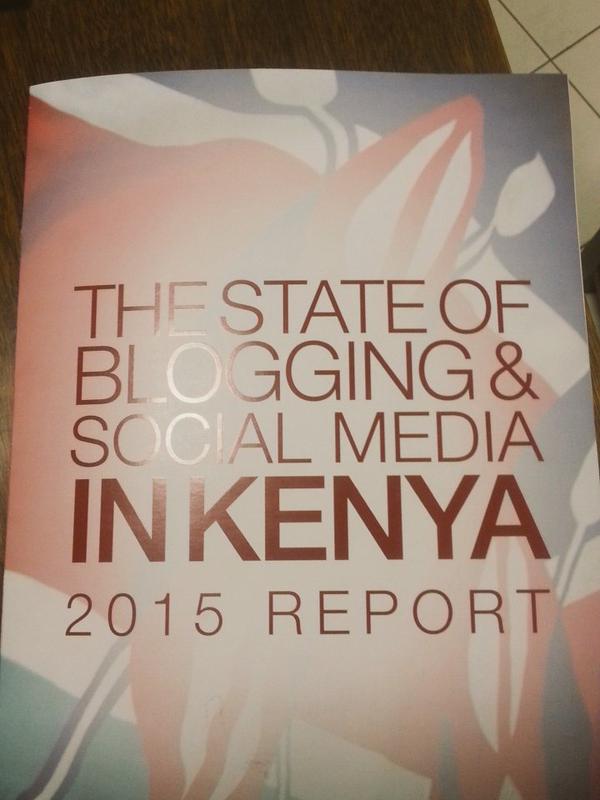
The cover of The State of Blogging and Social Media in Kenya 2015 Report.
The Bloggers Association of Kenya (BAKE) released a report earlier this week about the state of blogging and social media in Kenya in 2015. The unveiling took place at Nailab, a start-up accelerator in Nairobi, Kenya, where the Cabinet Secretary for ICT Fred Matiang’i officially introduced the report.
BAKE is a community organization that represents a group of Kenyan online-content creators and seeks to empower innovation in this field and improve the quality of content created on the Web.
The report, which is available for download, seeks to validate the organization's work on prosecutions and episodes of intimidation to discourage dissidents online:
This report also seeks to highlight the significant gains made by bloggers in the promotion of free speech as well as in the creation of quality and diverse content about Kenya on the internet
According to the report, Kenyan blogging started in 2003 with Mental Acrobatics, the blog owned by the Godfather of Kenyan blogging, Daudi Were. The first Twitter account in Kenya was registered in March 2007 by @kamuiri. The country now has close to 1.2 million Twitter users and 15,000 registered blogs.
According to Digital Africa, there are 15 facts one needs to know about the state of Kenyan blogging and social media:
1. The first blog to be published in Kenya was mentalacrobatics.com by Daudi Were in 2003.
2. Kenya has 15,000 registered blogs with 3,000 being active blogs according to The Bloggers Association of Kenya (BAKE) .
3. The first Twitter account in Kenya @kamuiri was registered on 28th March 2007
4. Kenya has close to 2.1 million users on Twitter with more than 700,000 monthly active users (MAUs)
5. There are 4.3 million Kenyans on Facebook
6. Kenya has a mobile penetration of 82.6%
7. There are 26.1 million Internet users in Kenya
8. The value of online advertising industry in Kenyan stood at Ksh.165 billion by the end of 2013 and is projected to rise to over Ksh.301 Billion by 2018.
9. Brands in Kenya are now appointing bloggers and influencers as brand ambassadors. The big challenge facing brand influencer relations and public relations is the issue of disclosure and this is due to the lack of a legal framework requiring them to disclose if their social media updates are brand endorsements
10.There is increasing pressure from the authorities to regulate bloggers and subject them to the same manner of strict regulation as journalists. There are about five Kenyans who have been prosecuted because of what they’ve published on microblogs.
One of the issues that stands out in the report is the Kenyan government's attempt to suppress online free expression. Shitemi Khamadi, for instance, argues that the use of social media defines Kenya's Internet freedom concerns:
More recently in 2015, blogger Abraham Mutai and web developer Geoffrey Andare have had their freedoms threatened in one way or the other through use of the law. Mutai’s blog was pulled down while his twitter account also suspended for some hours. Other cases included Nancy Mbindalah and Allan Wadi.
On Twitter, the hashtag #iFreeKe is the official tag for discussing the report, which many in Kenya and abroad and welcomed warmly.
Olé Laibuta refuted the idea that the “GOK” (Government of Kenya) is cracking down on the Web.
‘no amount of insults will prompt GOK to limit fundamental freedoms’ @FredMatiangi #ifreeke
— Olé Laibuta (@Olez) June 16, 2015
The Bloggers Association of Kenya noted the difficulty working with government institutions that do not have enough social media skills:
We're working with police who are very ignorant of how social media works – @BonifaceMwangi #iFreeKe
— BAKE (@BAKE_ke) June 16, 2015
The Ministry of Information, Communication, and Technology acknowledged the report by issuing the following statement:
CS @FredMatiangi : social media should be a credible and responsible tool for social engagement @thenailab #iFreeKE pic.twitter.com/Yny94QgDxn
— Ministry of ICT (@MoICTKenya) June 16, 2015
While Kenyan blogger Rayhab Gachango had an advise for African social media users:
We should use social media to unleash our potential and engage well in the democratic space. CS @FredMatiangi #iFreeKE cc @BAKE_ke
— Rayhab Gachango (@potentash) June 16, 2015
Kapkirwok had some advice to give and a warning to pronounce:
Many young upcoming keyboard worriors don't know rules of web 2.0 it impacts society and same time destroy #iFreeKE
— Kapkirwok® (@OriopLangat) June 16, 2015
Shiko-Msa said something that many Internet users would likely embrace:
You have the freedom alright, but you have responsibilities too. Do not go insulting people on social media. #iFreeKe
— Shiko-Msa (@Shiko_Msa) June 16, 2015
TechMoran interpreted the report to be a sign of the new media era of tomorrow:
Communication has moved to a new level. Were in a new era of media. Uhuru Kenyatta with a million followers is a media owner. #ifreeke
— TechMoran (@TechMoran) June 16, 2015
Writing about the same idea, Nailab explained:
Traditional media is fading so we need to pay attention to the next space that media is taking – @FredMatiangi #iFreeKE
— Nailab (@thenailab) June 16, 2015
After reading the report, Bankable decided to post the text about the B word in the report:
B for billion #ifreeke pic.twitter.com/pxBcbBfQAx
— bank·a·ble (@mbuguanjihia) June 16, 2015
The Committee to Protect Journalism focused particularly on online freedom:
The rights of bloggers and social media users in #Kenya under threat @bloggersafrica #KOT #Bloggingisnotacrime https://t.co/nBt9pbYPIE
— africa @pressfreedom (@africamedia_CPJ) June 17, 2015
Read the whole report here.







6 comments
When you say: “One of the issues that stands out in the report is the Kenyan government’s attempt to suppress online free expression.” I´d like to know how exactly does the government attempt to supress the freedom of online expression and if there are some cases of people persecuted for blogging..?
http://nairobinews.co.ke/why-safaricom-has-sued-blogger-cyprian-nyakundi/